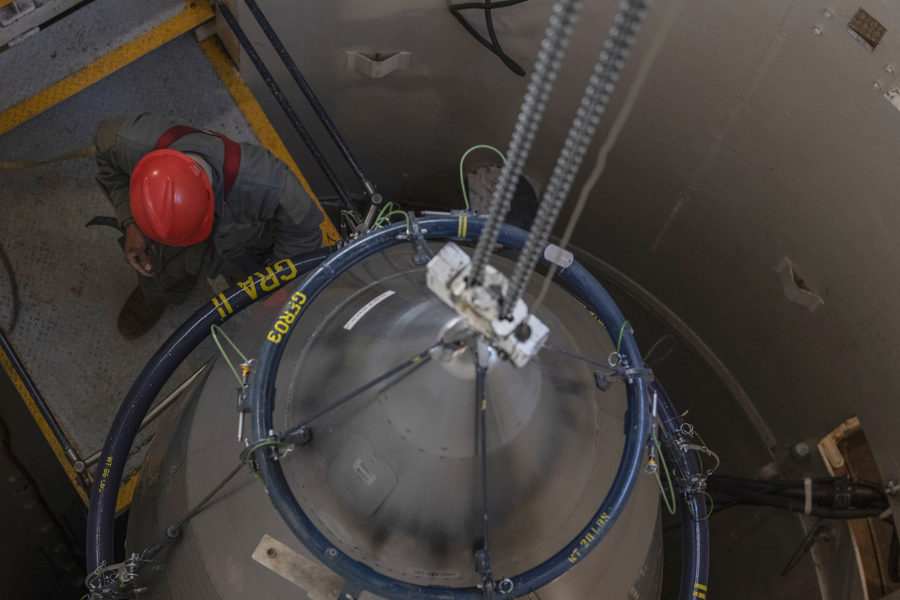Nuclear modernization concerns are again on the table for fiscal 2021 defense policy negotiations, as House lawmakers raise issues about the path forward.
The Air Force’s three major nuclear weapon upgrade programs—the Ground-Based Strategic Deterrent, the Long-Range Standoff Weapon, and the B61-12 bomb—all received the funding they requested in the House Armed Services Committee’s version of the fiscal 2021 defense policy bill. Those programs total $2.9 billion for the upcoming year, split between the Defense and Energy Departments.
That contrasts with last year’s process, when Democrats tried to shrink GBSD funding in a move that irked Republicans and contributed to a broader clash over nuclear issues. Keeping nuclear modernization fully funded and on track is typically an area of bipartisan agreement. Still, some members of Congress last year sought an independent study on whether the Air Force could keep its current Minuteman III missiles around longer, an idea the service opposes because it says refurbishment costs would outweigh the benefits.
Developing more than 600 new land-launched missiles is slated to cost nearly $22 billion, and $4.5 billion for about 1,000 new air-launched missiles. The revamped B61 bomb could cost about $12 billion between DOD and DOE, while the future B-21 bomber’s price tag is classified.
Now that House lawmakers seem to have reached an agreement about the need to fully fund nuclear weapons development (as the Senate Armed Services Committee also wants), they want assurance that the Air Force can pull it off. That has spurred some worry in the arms control arena that Democrats are stepping back from meaningful oversight.
House legislation “raises zero questions about the value of the modernization plan, only its achievability. Deeply troubling,” Stephen Young, a senior analyst at the Union of Concerned Scientists, wrote on Twitter.
The strategic forces subcommittee pointed to a 2019 RAND Corp. report that warned of the difficulties Air Force Global Strike Command, a relatively new organization with a small, young workforce, will have in replacing all of its major systems around the same time. That also includes the B-21, which HASC is offering the full request of $2.8 billion in unclassified money for 2021.
Because of that looming workload, lawmakers want a report from the Air Force by Dec. 1 on how Global Strike is addressing the issues RAND raised.
“The report should also provide the number of unfilled personnel manning positions at the command and the GBSD program office, and the number of and type of personnel required to reduce schedule and technical risks to the major programs that the command and the program office are managing,” lawmakers wrote.
Air Force Magazine reported in February that the service is waiting on Northrop Grumman, the missile’s designer, to decide how many people would need to run the system before reviewing manpower needs.
GBSD won’t be ready to use until 2029 at the earliest, three years after the U.S. comptroller general found that the existing Minuteman III nuclear missiles will no longer be fully capable. That concerns lawmakers whom the Air Force has repeatedly told there is no room for error in the land-launched missile’s development schedule. The House wants a report from U.S. Strategic Command, which oversees the nuclear enterprise, and the Air Force on how the two are planning for a GBSD fielding delay of two years or more, and how to address the risks that slowdown would pose to Minuteman III.
“By 2030, the Department of Defense will develop and deploy a range of new, long-range conventional strike systems, of which some will be under the operational control of [the] commander of [STRATCOM],” the subcommittee added. “Given the strategic implications of these systems, the committee encourages the department to take additional consideration with regard to the strategic and legal implications of such systems.”
HASC also calls for a report on the use of artificial intelligence in the nuclear enterprise.
The strategic forces subcommittee approved its bill June 22; the full committee will begin debating its legislation July 1.
